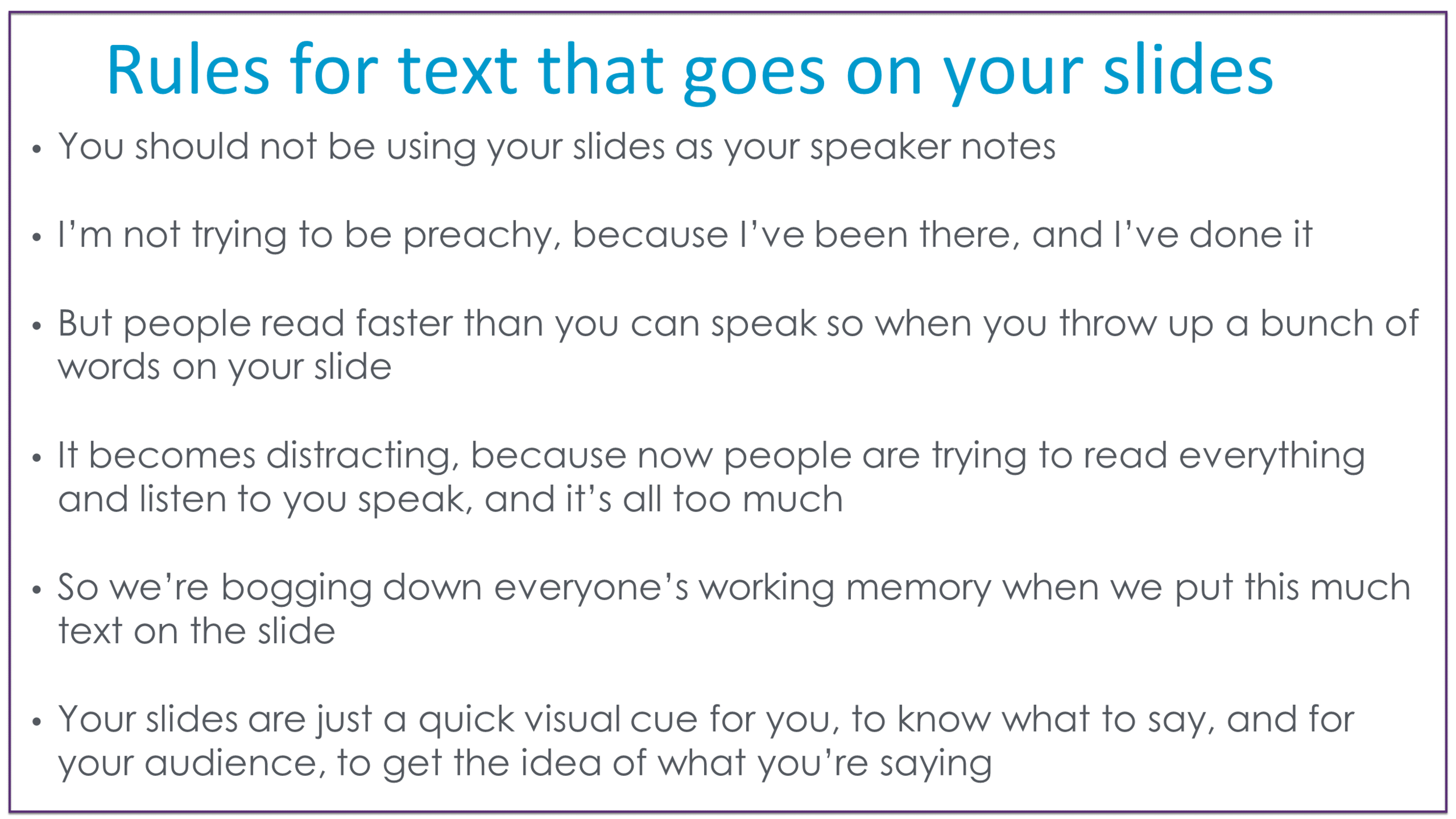What is your Potential Presentation Impact and How Do You Calculate It?
Have you ever thought about what your Potential Presentation Impact is?
How many presentations do you give each year?
I'm talking about your class lectures, conference presentations, volunteer training, community outreach, and other situations where you use slides (e.g., PowerPoint, Keynote). If it goes up on a slide and you talk about it to others, count it.
I'm serious: (1) Calculate that sh*t, and (2) write the number down.
Here's an example:
Ndidi teaches in a semester system. That's 16 weeks x 2 classes/week = 32 presentations per class, per semester.
She teaches 3 courses per semester, so that's (32x3) = 96 presentations per semester.
And she teaches for 2 semesters, so that's (96 x 2) = 192 presentations per year.
She also does 2 conference presentations each year, bringing the total up to 194 potential presentation impacts.
That's 194 opportunities to make an impact PER YEAR!
Now I want you to go one step further and think about how many people you have the opportunity to impact.
Back to our example:
Let's say each of Ndidi's classes had 30 students, and 30 people attended each conference presentation.
That would be 30 x 6 (6 classes per year) + 60 (2 conference presentations) = that's 240 people she can reach in just one year!
Now multiply that over 10 years: Ndidi has reached 2,400 people with her presentations in a decade. At least.
I want to know what your #PotentialPresentationImpact is. Tweet your number to me!
"Hey, wait. That example is for professors. What about those of us who don't teach?!"
Excellent question. Honestly, even if you only present 5 times each year, that's still 5 opportunities to make a positive social impact! Want to know how many presentation opportunities my parents have? Zero. I bet you have a lot of people in your life who don't need to do any type of presentations on academic, scientific, etc topics.
Use the opportunities you have to their fullest advantage.
Plus, don't forget to think about how many people that is each year.
So, no matter what your #PotentialPresentationImpact number is, that's an awesome opportunity for you to make a positive social impact with your work!
Ok, now I want you to write down how many manuscripts you've published in a year.
Yup. We're going there.
How does the impact compare?
I'm willing to bet that you have a MUCH larger potential for impact with presentations.
Here's an example:
Ndidi submits multiple manuscripts per year, but due to the obnoxiously long review process, tends to get 2 articles published per year (if that, lol).
That's 2 opportunities to make an impact...compared to 194 with presentations.
And let's not even talk about how many people even read that article...
*cough*
*slurps coffee from unicorn mug*
And no, I'm not saying pubs are a waste of time. I'm really not.
I'm trying to bring attention to how we tend to worship publications, almost religiously. No one critiques how long you spent writing a manuscript, even though only (small number) will probably read it in its lifetime.
Yet, we balk at the idea of investing time in storyboarding, designing, and delivering an awesome presentation, even though it CLEARLY has a bigger potential for making a positive social impact.
So, what I'm actually trying to advocate for is that we collectively value presentations MUCH more than we do now. We can do that without devaluing publications. This is a both/and situation, mmmmkay!
But did you notice I said this number is your POTENTIAL presentation impact?
Because your impact depends on the effectiveness of your presentations.
Which presentation do you think will be easier to follow and, ultimately, more memorable? That, by the way, is the same thing as asking: Which presentation do you think will be more effective at getting your message across?
A presentation where most slides look like this?
...or a presentation where most slides look like this?
The answer is obvious. But what isn't as obvious is HOW to go about making a slide that is effective and a presentation that will resonate. You won't know that unless you take training on these strategies (or spend hours upon hours researching it on your own),
But for some reason we aren't trained to storyboard, design, or deliver effective presentations.
That's how we get slides like this:
Do your slides look like this?
To me, all that says is you haven't had formal training on effective presentation. It doesn't mean you're a "bad presenter" or a failure. I'm anti-shaming when it comes to this because training is rare. Still, if your slides look like this then it's time to join my email list now so you can get the training you need to deliver awesome presentations:
What's wrong with that slide?
There is a visual, yes, but it's used incorrectly (in a few different ways). There are at least 5 other information design principles that are violated in this slide, and a major storyboarding violation that would be the kiss of death for this entire presentation.
Yikes. That's a LOT of problems with this slide. If you're surprised, then let me ask:
How much professional development training have you had that was specifically focused on how to storyboard, design, and deliver presentations that make a lasting impact?
I'm going to guess...
....
none :)
Or, at the most, you've done something like take a training webinar (one of mine, perhaps) or a conference workshop.
...so almost none, then.
For some reason, even though we create slides (powerpoint, keynote, etc) ALL. THE. TIME we don't get good training on how to do it well.
Hmmm...It's almost like people assume that effective presenting is really just a technical skill, and that if you learn how to use PowerPoint, you'll be able to create awesome presentations.
bwahah.
Could not be further from the truth. Think about it:
Is learning how to conduct statistical analyses really just a matter of learning how to use the software?
No. Exactly. So why do we treat effective communication as something we can learn without proper training?
There is a huge disconnect in our field: We devalue one of the most valuable opportunities we have to make a positive social impact with our work.
Why we need better communication skills.
Why do I care so much about effective communication and effective slide design?
Around the time I finished my PhD, I looked around and realized that #DeathByPowerpoint was the status quo. And that scared the coffee beans out of me.
It felt like torture to listen to a presentation about a topic I actually cared about and already believed in. So, if *I* had to fight to pay attention, felt overwhelmed, and still struggled to use the information later on...then what hope did we have when sharing information with people who aren't that thrilled about the subject, or maybe even disagreed with it?
Even worse, what hope did we have of resonating with people when we present using #DeathByPowerpoint **AND** anti-science, anti-progress folks are better communicators. When anti-science/progress groups (think: MRAs, MAGAs, Anti-vaxxers) have a terrible message that fits on a bumper sticker and resonates on a emotional level.
The answer to that is what scared me. Because the answer was: Oh, shit. We didn't stand a chance.
Think I'm exaggerating? We're seeing measles outbreaks, oil companies blocking green solutions even though we're all baking to death in this heat, people saying things like "blue lives matter" or making fun of the #metoo movement, and fascism is getting stronger in the U.S. UGH. That's depressing.
And yes, I know the reasons for these are complex--there is never a single cause, nor solution, for any given problem. I have a PhD in Community Psychology, which is a degree focused on understanding how to leverage sociopolitical and state/organizational structures for positive social change. Community psychologists are allergic to individual level deficit-based solutions (most of us, anyway). I also know these aren't new problems, just repackaged from centuries of oppression and backlashes against progressive movements. I'm not trying to dismiss that.
But I can tell you ONE key part of their success (and our mistake): they are experts at effective communication.
They know how to communicate their message clearly, quickly, and with a lasting impact. They know how human emotions work and use that to their advantage.
Too many people in progressive academic and scientific fields struggle with this. Academic/scientific progressives too often try to dump facts and information onto their audience to convince them. We try to use logic and information, actively avoid using emotions, and use lots of text to appear professional and trustworthy. Too often we try to throw graph after graph in people's face, only to be shocked when people don't understand the core message of the data.
Too often, academics and scientists falsely assume that people don't agree with them due to lack of information. "If only they had the same information I possess, then they'd realize I'm right!"
Not. True.
This deficit approach to communication (and social issues in general) has been widely disproven by others. There are a lot of other things that influence how your message is received, it's not just the information. But, we aren't trained on any of that!
And it's part of why so many of us struggle to be heard (believed) over alt facts and regressive ways of thinking. If anything, our audience doesn't have the deficit--we do! And what we lack is effective communication skills.







